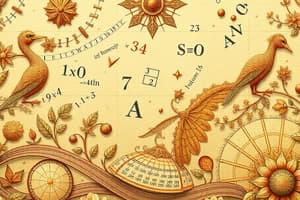Podcast
Questions and Answers
Mathematics is primarily concerned with the study of quantity, structure, space, and connection.
Mathematics is primarily concerned with the study of quantity, structure, space, and connection.
False (B)
Algebra primarily focuses on solving polynomials and factoring.
Algebra primarily focuses on solving polynomials and factoring.
True (A)
Geometry studies the properties of numbers and their relationships.
Geometry studies the properties of numbers and their relationships.
False (B)
Calculus includes concepts such as derivatives, integrals, and rates of change.
Calculus includes concepts such as derivatives, integrals, and rates of change.
Statistics is solely focused on collecting data without any analysis.
Statistics is solely focused on collecting data without any analysis.
Discrete mathematics deals with continuous quantities.
Discrete mathematics deals with continuous quantities.
The measure of central tendency includes mean, median, and standard deviation.
The measure of central tendency includes mean, median, and standard deviation.
Number theory studies properties of integers and their divisibility.
Number theory studies properties of integers and their divisibility.
Flashcards
Mathematics
Mathematics
The study of quantity, structure, space, and change using logic and abstraction.
Arithmetic
Arithmetic
The branch of mathematics dealing with basic operations: addition, subtraction, multiplication, and division.
Algebra
Algebra
A branch of mathematics that uses symbols to represent and solve equations involving unknown quantities.
Geometry
Geometry
Signup and view all the flashcards
Calculus
Calculus
Signup and view all the flashcards
Statistics
Statistics
Signup and view all the flashcards
Sets
Sets
Signup and view all the flashcards
Discrete Mathematics
Discrete Mathematics
Signup and view all the flashcards
Study Notes
Fundamental Concepts
- Mathematics is the study of quantity, structure, space, and change.
- It uses logic and abstraction to understand patterns and relationships.
- Key branches include arithmetic, algebra, geometry, calculus, and statistics.
Arithmetic
- Arithmetic deals with basic operations: addition, subtraction, multiplication, and division.
- It forms the foundation for more advanced mathematical concepts.
- Includes concepts like integers, rational numbers, and irrational numbers.
- Properties of numbers (e.g., commutative, associative, distributive).
Algebra
- Algebra uses symbols (variables) to represent unknown quantities.
- It focuses on relationships and solving equations.
- Key concepts include linear equations, quadratic equations, systems of equations, and inequalities.
- Polynomials and factoring.
Geometry
- Geometry studies shapes, lines, angles, and their properties.
- Branches include Euclidean geometry, non-Euclidean geometry, and analytic geometry.
- Key concepts include points, lines, planes, angles, triangles, quadrilaterals, circles, and 3D shapes.
- Formulas for area and volume.
Calculus
- Calculus is concerned with change and motion.
- Includes differential calculus (rates of change) and integral calculus (accumulation of quantities).
- Key concepts like derivatives, integrals, limits, and applications to physics and engineering problems.
Statistics
- Statistics deals with collecting, organizing, analyzing, and interpreting data.
- Key concepts include measures of central tendency (mean, median, mode), dispersion (range, variance, standard deviation), probability, and statistical inference.
- Used in many fields to draw conclusions and make predictions.
Sets and Logic
- Sets group objects together.
- Symbols and operations on sets (union, intersection, complement).
- Logic studies reasoning and arguments.
- Concepts like statements, quantifiers, and logical connectives (AND, OR, NOT).
- Use of truth tables.
Discrete Mathematics
- Discrete mathematics deals with objects that are distinct or separate.
- Concepts include graph theory, combinatorics, logic, and number theory.
- Application to computer science, algorithms, and information theory.
Other Important Topics
- Number theory studies properties of integers and divisibility.
- Abstract algebra deals with abstract structures (groups, rings, fields).
- Linear algebra focuses on linear equations and transformations.
- Trigonometry relates angles and sides of triangles.
- Complex numbers extend the number system.
Studying That Suits You
Use AI to generate personalized quizzes and flashcards to suit your learning preferences.




